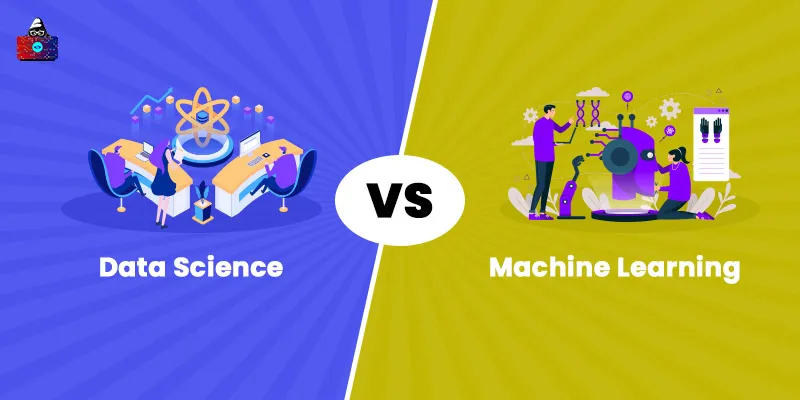Data science vs machine learning is a raging topic. This article discusses both data science and machine learning. Their similarities and differences.
Recently, I saw a WhatsApp message doing the rounds regarding the pre-screening for Coronavirus using AI technology. I was baffled to know that AI has made so many advancements, that it could detect a potential positive or negative based on some questions to detect symptoms without a person going to the hospital.
How is this possible? How could a system know what to ask each individual and how does it ask all the right questions based on previous answers by the user?
The answer to these questions is machine learning. Through ML algorithms, a machine can interact with humans using speech recognition and voice modulation, and with the data and facts, it can also ask relevant questions to the users.
How Do We Get the Data and Facts?
The machine collects data using many sources, like surveys, databases, and questionnaires. Thereafter, this data has to be processed to make it usable. The processed data is then analyzed for patterns, trends, and behavior to conclude. For example, if people answered a ‘no’ for an itchy throat, but a ‘yes’ for cough, it could be a normal flu and more questions to confirm whether it’s a normal flu will be asked.
However, if both answers are yes, then the next question about the next symptom can be asked. This entire process of collecting, processing, analyzing data and making conclusions comes under data science. Machine learning, on the other hand, is the process of training machines to perform certain tasks. Before we delve into data science vs machine learning, let's first know the two terms.
What is Data Science?
As we learned above, data science is a vast process involving many steps. The most popular and one of the highest-paying jobs in the industry, a data scientist always has a lot on his plate. This is because the world is going digital, and hence, a lot of data is generated every minute. All that data science does is separating the useful data from the not-so-useful data and then process the meaningful data to get useful insights.
What is Machine Learning?
Machine learning is a technique that helps to train machines to perform analysis on huge sets of data. Various algorithms are available to train the machines. Moreover, machines learn through a combination of data and experience. Machine learning is a subset of artificial intelligence that aims to make machines think and make decisions on their own, thus reducing human error. It aims to make business processes faster and easier. There are 3 main types of machine learning:
- Supervised learning
- Unsupervised learning
- Reinforcement learning
There are many ML algorithms with the simplest being linear regression . Here, the output can be expressed as a linear function of the input, with the coefficient and slope. The linear plot is derived after marking all the data points and finding the best fit (the line that crosses the maximum number of data points).
With this linear equation, it is possible to form the input-output mapping function and built a model on it. This model can be trained and tested by using huge datasets. Once the model is ready, it can give accurate results for making informed business decisions. Some popular applications of machine learning are:
- Movie recommendations.
- Virtual voice assistants, like Alexa and Cortana.
- Google Translate.
The Correlation
Both data science and machine learning deal with data, but then 2 questions pop up:
How do data science and machine learning relate to one another? What is the difference between data science and machine learning?
While data science focuses on data, machine learning focuses both on learning and data. Data science is business-oriented while machine learning is purely technical. More importantly, out of the many stages in the data science lifecycle , machine learning plays a vital role in the data modeling and analysis stage. Also, machine learning algorithms are much preferred over traditional statistical analysis and algorithms. This is because they reduce much coding work and produce accurate results.
Is Machine Learning Mandatory for Data Science?
Machine learning is that phase of data science that helps businesses make bold future decisions with confidence. The predictions made by machine learning models have been good enough so far as to use them in solving more complex business problems. Not necessitating much human intervention is another plus. Further, ML is constantly innovating and in the future, likely to grow. Hence, ML is becoming an essential component of data science.
What Should You Choose as Your Career – ML or Data Science?
Before we move on to discuss data science vs machine learning, we would like to make one last point. If you are having confusion regarding which one to choose then, unfortunately, there is no right answer. If you are a purely technical person and love mathematics and statistics, ML is certainly the way to go. However, if you like to explore various domains, work with business analysts, and have a flair to always look at the bigger picture, data science will be more suitable for you. That said, once you get into data science, you will need some basic understanding of ML as well, though not too deep.
Career-wise, both ML and data science are innovation-oriented and well-paid jobs with the demand only increasing with each passing day. In about a decade, there will be more demand for both data scientists as well as ML engineers. So, you can get both work satisfaction and good pay irrespective of the choice you make!
Data Science vs Machine Learning: A Head-to-head Comparison
We already covered how both data science and ML are related and are great as a career choice. There are, however, a lot of differences when it comes to the skillset, actual salary paid, roles and responsibilities, and the basic definition itself. In this section, we will discuss all the above. Let us look at the differences:
| Data Science | Machine Learning |
| It involves a lot of processes like the collection of raw data, preparing and transforming it, modeling the data, visualizing, reporting and concluding insights from the data. | It relates to the data modeling phase and also involves some data preparation to create and split datasets. |
| The scope is huge. | Limited scope. |
| Although ML algorithms are preferred, data science can be done with traditional algorithms and statistical methods. | There is no use of data modeling and ML if there is no data science. |
| It is an independent, interdisciplinary field, which is related to AI through ML. | It is a branch of AI. ML helps to reduce human errors. |
| The problem is identified first and then various techniques are used to find the most appropriate solution. | The problem is already known, and the focus is on building an algorithm to find the best solution. |
| It is all about data and just a little about learning. | Both data and learning are important. |
| The average salary of a data scientist is around $95k for entry-level and $185,000 for managerial-level. | The typical salary range for an ML engineer is about $125,000 to $176,000. |
| Almost all data scientists need to be familiar with a relational database , SQL, Hadoop and know how to write simple queries for data manipulation. | ML engineers don’t have to know SQL. They work on programming languages, like Python, R, Java, and C++. |
| Other than domain expertise and technical skills, data scientists must possess certain non-technical skills, like identifying business opportunities, problem-solving skills, business acumen, creative thinking, and good communication. | ML is purely technical. Therefore, a machine learning engineer should be adept in programming languages, writing algorithms, understanding signal processing techniques, performing statistical analysis, fine-tune the model they build, and use the latest libraries and frameworks. |
| Data scientist jobs are exploding and in high demand in every part of the world. | ML jobs are quite popular, and the demand is going to increase, a lot of research is underway for the entire AI spectrum |
| Popular data science applications are in healthcare, targeted content marketing, and fraud detection. | ML applications are in NLP, email filtering, product recommendations, and medical diagnosis. |
Conclusion
In this article, we explored data science and ML in brief and understood the important differences between the two. A research-intensive field, ML is yet to realize its full potential as AI, from which ML branches out is still in its initial stages. Data science helps to solve various business problems and provide predictions and solutions to complex, real-world problems.
If you are wondering where to start, our suggestion will be to start with basic ML algorithms. As you go along, eventually try to view the bigger picture. Also, learn how to define problems, prepare relevant data sets and use the inference by models to make workable business decisions. If you know ML, you can move into the broader field of data science easily.
People are also reading:
- What is Machine Learning?
- Best Machine Learning Interview Questions
- Machine Learning Books
- Best Machine Learning Frameworks
- How to become a Machine Learning Engineer?
- Machine Learning Projects
- Classification in Machine Learning
- AI vs. ML vs. Deep Learning
- Machine Learning Applications
- Machine Learning Algorithm
- Decision Tree in Machine Learning





Leave a Comment on this Post